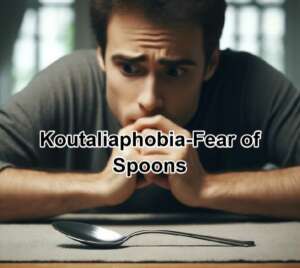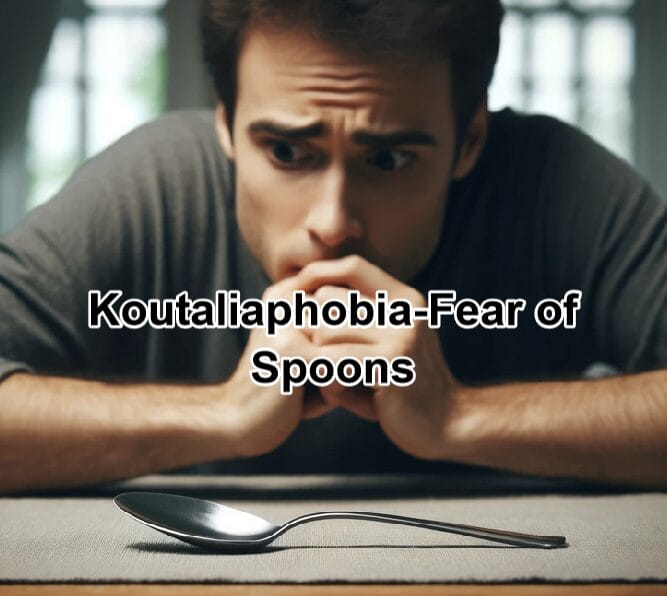Share This Article
Koutaliaphobia: Understanding the Fear of Spoons
Koutaliaphobia might sound unusual or even quirky to those unfamiliar with it. However, for those who suffer from this fear, the phobia is real and can be significantly disruptive. Koutaliaphobia, or the fear of spoons, is a specific phobia that involves an irrational fear of spoons. This fear can manifest in both mild and severe forms, affecting daily life and eating habits. Let’s dive into what this phobia is, how it can develop, its symptoms, and what treatments are available.
A Personal Story about Koutaliaphobia
Jules had always been uneasy around spoons. Her family found it peculiar, a quirk that had been the subject of many light-hearted jokes over the years, to the point of nicknames like “spoons”. But for Jules, this fear was real and near debilitating. This deep-rooted fear started when she was just five years old, a quiet normal family dinner where she accidentally choked on her banana split dessert, struggling for air with a spoon still in her mouth. That simple incident would through the years manifest and imprint a deep fear in her young mind, a fear that grew into a full-blown phobia.

Now in her twenties, Jules found her daily life actually affected by her strange fear of spoons. She tried to avoid social gatherings and events that involved meals, fearing that she might have to confront her anxiety head-on, yes the fear can be that strong. At home, she replaced all the spoons with popsicle sticks, forks and knives—even her tea was stirred with a butter knife. These eating implements may seem to be the same to us as a spoon, but to Jules they were miles apart in difference.
Her phobia felt like a shadow, following her into every kitchen and dining room, turning what many considered an innocuous utensil into a symbol of fear. This fear isolated her, she knew people would not understand why a spoon could cause her fear. This is the difficult aspect of a phobia, explaining to others why in this case a simple item could cause havoc in her life.
After several embarrassing incidents Jules tried several self-help options. Her fear was too much for these options so she went to professional help. Her online therapist introduced her to Cognitive Behavioral Therapy (CBT) and gradual exposure therapy. Slowly, she learned to sit with her fear, to hold a spoon in her hand, and eventually, to use one. This approach took several months, each small victory was hard-won but celebrated as a significant step towards overcoming her koutaliaphobia. Through hard work with her therapist and support from close friends, Jules began to see spoons not as objects of fear, but as the simple eating tool it is. Her phobia may not be cured but she has taken many steps forward to living free of fear.
Technically, What Is Koutaliaphobia?
- Definition: Koutaliaphobia is the intense, irrational fear of spoons. Unlike a general dislike or discomfort, this phobia invokes a deep-seated dread.
- Impact: This phobia can complicate everyday activities such as eating, cooking, or dining in public.
How One May Develop Koutaliaphobia
- Negative Experiences: Like many phobias, koutaliaphobia can stem from a negative or traumatic experience involving spoons. This might be a choking incident during childhood or a particularly embarrassing moment involving a spoon.
- Learned Behavior: Observing a significant figure in one’s life reacting negatively to spoons can also plant the seeds of this phobia.
- Associative Phobia: Sometimes, the fear might develop without a direct incident but as an association with another phobia, like the fear of sharp edges or metallic objects.
Symptoms of Koutaliaphobia
Physical Symptoms
- Panic attacks: Experiencing symptoms such as rapid heartbeat, sweating, and shaking at the sight or thought of using spoons.
- Avoidance: Going to great lengths to avoid situations where spoon usage is expected, such as meals or social gatherings.
- Gastrointestinal distress: Nausea or stomach cramps when thinking about or encountering spoons.
- Trembling: Shaking or trembling when in close proximity to spoons.
Mental/Emotional Symptoms
- Intense anxiety: Feeling overwhelming dread when faced with the prospect of using or handling spoons.
- Obsessive thoughts: Constant worry about encountering spoons can dominate one’s thoughts.
- Emotional distress: Feelings of hopelessness or sadness about the challenges in managing everyday eating habits.
Treatment: Self-Help and Professional Help
Self-Help Strategies
- Understanding the phobia: Educating oneself about the irrational nature of the phobia can help in rationalizing the fear.
- Relaxation techniques: Engaging in relaxation practices such as deep breathing, meditation, or yoga to manage anxiety.
- Gradual desensitization: Slowly exposing oneself to spoons in a controlled manner to lessen the fear response. This might start with looking at pictures of spoons, then touching a spoon, and gradually leading up to using one.
Professional Help
- Cognitive behavioral therapy (CBT): This form of therapy is effective for phobias as it involves altering thought patterns and reactions associated with the phobic object.
- Exposure therapy: A technique used in CBT, where the patient is gradually and systematically exposed to the source of their fear under the guidance of a therapist.
- Support groups: Joining groups where individuals share similar fears can provide support and coping strategies.
- Medication: While typically not the first line of treatment for phobias, in severe cases, medications such as anti-anxiety drugs can be prescribed to manage symptoms.
In Conclusion
While koutaliaphobia may seem almost too strange to be a real phobia, it is. Understanding that it is a recognized and treatable condition can help provide comfort and even hope. By starting with self-help options and then moving to professional help if needed. Someone with this rare phobia can overcome their fear of spoons. The key is patience and gradual exposure, combined with professional support, which can significantly improve the ability to beat this phobia.
Ultimately, overcoming koutaliaphobia can open up a fuller, less restricted life where the simple act of eating becomes a non-issue rather than a source of anxiety. Remember, progress might be slow, but with consistent effort and the right strategies, managing and potentially overcoming koutaliaphobia is achievable.



